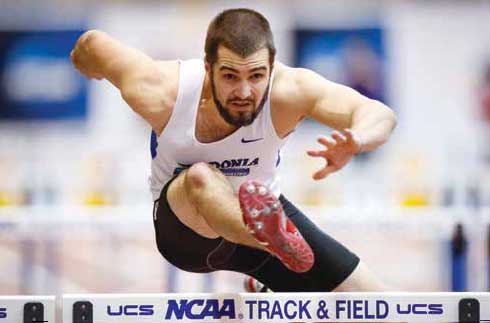
May graduate and triple business major Spencer Lefort
by Jerry Reilly, director of Sports Information
As Spencer Lefort approached the start line for the final event, another competitor noticed the mistake. The official in charge of placing the 12 men in line for ECAC Division III heptathlon’s 1,000-meter run last March had mixed up the order.
Lefort, solidly in first place, needed to be on the inside lane – the shortest way around the New Balance Armory’s banked 200-meter oval. Instead, Lefort had been told to stand in lane No. 2, and Victor Servito of Stevens Institute was placed in lane No. 1.
Servito took matters into his own hands. As the public address announcer called out the names of each of the competitors, starting from the outside lane and working inward, Servito grabbed Lefort and switched places, then lifted Lefort’s arm over his head like a boxing referee declaring the winner in the middle of the ring.
“I was fine with where I had been placed,” said the unassuming Lefort, almost sheepish over the special attention Servito’s act of sportsmanship bestowed.
Lefort’s 1,000-meter time was 2:47.04 – sixth fastest in the race – and left him with a final two-day score of 4,946 points. It was a new meet, SUNYAC and Fredonia State record. It was also the third best score inNCAA Division III and guaranteed him a spot in the 13-man field at nationals the following weekend.
Prior to the trip to Naperville, Ill., Lefort was named Atlantic Region Male Indoor Field Athlete of the Year by the United States Track & Field and Cross Country Coaches Association. It was the first in a series of awards he would receive over the next few months.
The next was the hallowed distinction of All-American. Despite a quick turnaround from ECACs, Lefort finished seventh at Naperville to become Fredonia State’s first male All-American multi-athlete in 27 years – and only its fifth all-time. The previous four – Ron Przybocki in 1983, Charles Collins in 1985, and Bob Healy in 1984 and again in 1986 – won their awards in the decathlon. Collins and Healy are members of the Fredonia State Athletic Hall of Fame.
Naperville was Lefort’s second NCAA championship venue. His first was Claremont, Calif., for the men’s decathlon in the spring of 2012. His score of 6,306 points for the 10 events was a personal-best and good for 15th place. It also opened his eyes as to his own abilities.
“I finished 15th and I was happy with that,” he recalls, “but as I watched the guys I was competing against, and finished behind, I felt I could be right up there with them.”
A native of Java Center, in rural Western New York, he grew up on his family’s dairy farm and was exposed to long, hard days in the barns. That also made play time all the more attractive. Organized sports – youth soccer early, and track and field midway through high school at Pioneer Central School – provided a break from the daily chores.
“I found workouts to be fun,” he said. “I was not in a barn surrounded by a bunch of cows. I was out running with my friends.”
The family sold the farm when Lefort was 19. He needed to find other summer employment – and he took his farm boy work ethic with him. He worked his own shift and any extra shifts that were offered.
His summer workouts would have to wait.
His priority changed the summer between his junior and senior year of college. “Between my sophomore and junior years,” he said, “I was usually working night shifts at my summer job, and I picked up every extra shift that I could. I was losing sleep so when it was time for my workouts, I was pretty weak. I decided not to do that last summer.”
Lefort re-dedicated himself to the off-season voluntary workout plan given to him by Assistant Coach Justin McQuality, which consisted of stretching, weight training, aerobic exercises, etc.
“In track, in order to be a better athlete,” McQuality said, “you have to withstand and reach certain skill levels. You have to be strong to a certain point or flexible in a certain way or have a certain type of coordination. All that stuff is developed in the off-season.”
Lefort lifted weights, ran, swam and rode a bike. He returned to campus last fall in the best shape of his life – until an old hamstring injury flared up. He had been dealing with the injury for three years.
There was an irony in that in his coach’s eyes. The pre-existing injury, McQuality contends, was the direct result of Lefort neglecting the off-season workouts during the two previous summers.
“Last summer,” McQuality said, “was the first time Spencer ever did a full off-season plan. I gave it to him before, but he was so busy with work, and with thinking about paying for school and stuff like that, he didn’t have time to do it, or it was so far down his priority list, he only had time for certain things every once in a while.”
The injury caused him to miss some early indoor competitions (in addition to the multis, Lefort competes in the hurdles and the jumps at open meets). When he was finally healthy again, he embarked upon an ambitious schedule that was sure to test his fitness and level of endurance.
In early February, he won the Ithaca Bomber Multi Meet heptathlon with 4,360 points – then, the new school record – and was in New York City for the ECAC meet one month later. His appearance at Naperville marked his third multi-meet in five weeks.
“After the first event (the 60-meter dash), I could feel I wasn’t recovering like I normally did,” he said. “By the second day, I was exhausted. But other than my pole vault (score), my scores were nearly the same as at ECACs.”
McQuality admits Lefort’s revamped schedule was less than ideal – yet there was no other option.
“If he didn’t get hurt early in the season,” McQuality said, “there’s no doubt in my mind that he would have been challenging for the national championship. He wouldn’t have had to do two multis back-to-back and we would have been tapering for the national championships rather than (participating in) ECACs.”
Lefort was held out of the early portion of the outdoor schedule this spring, yet returned in time to finish second in the SUNYAC decathlon for the third time in four years. The only time he wasn’t second was his junior year, in 2012 – when he finished first. That resulted in his fourth straight All-SUNYAC award. In addition, he received the 2012 SUNYAC Chancellor’s Award for achieving the high grade-point average among all men’s track and field all-conference selections.
More awards followed. Lefort was named 2013 Fredonia State Male Student-Athlete of the Year. The voters – athletic department staff and coaches – were impressed with his combination of athletic success, academic achievement, community involvement and character. It turns out his love of multi-tasking extended to the classroom. He graduated in May with a 3.65 grade-point average as a triple business major: Accounting, Economics and Finance.
Members of the College Sports Information Directors of America (CoSIDA) took notice, too. First, CoSIDA voters selected Lefort to the Capital One Academic All-District team, and later as a Capital One Third Team Academic All-American. He was the only SUNYAC student-athlete – male or female – to make the Academic All-American team in track and field/ cross country, and just the fourth SUNYAC athlete in all sports honored by CoSIDA during the 2012-13 academic year.



